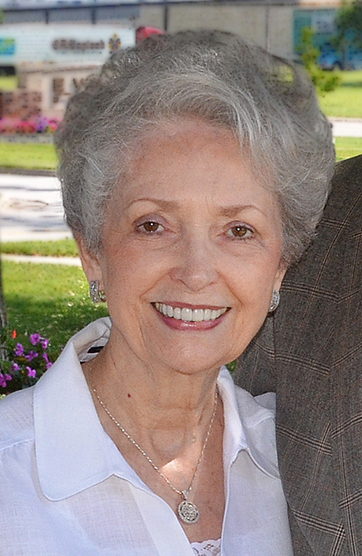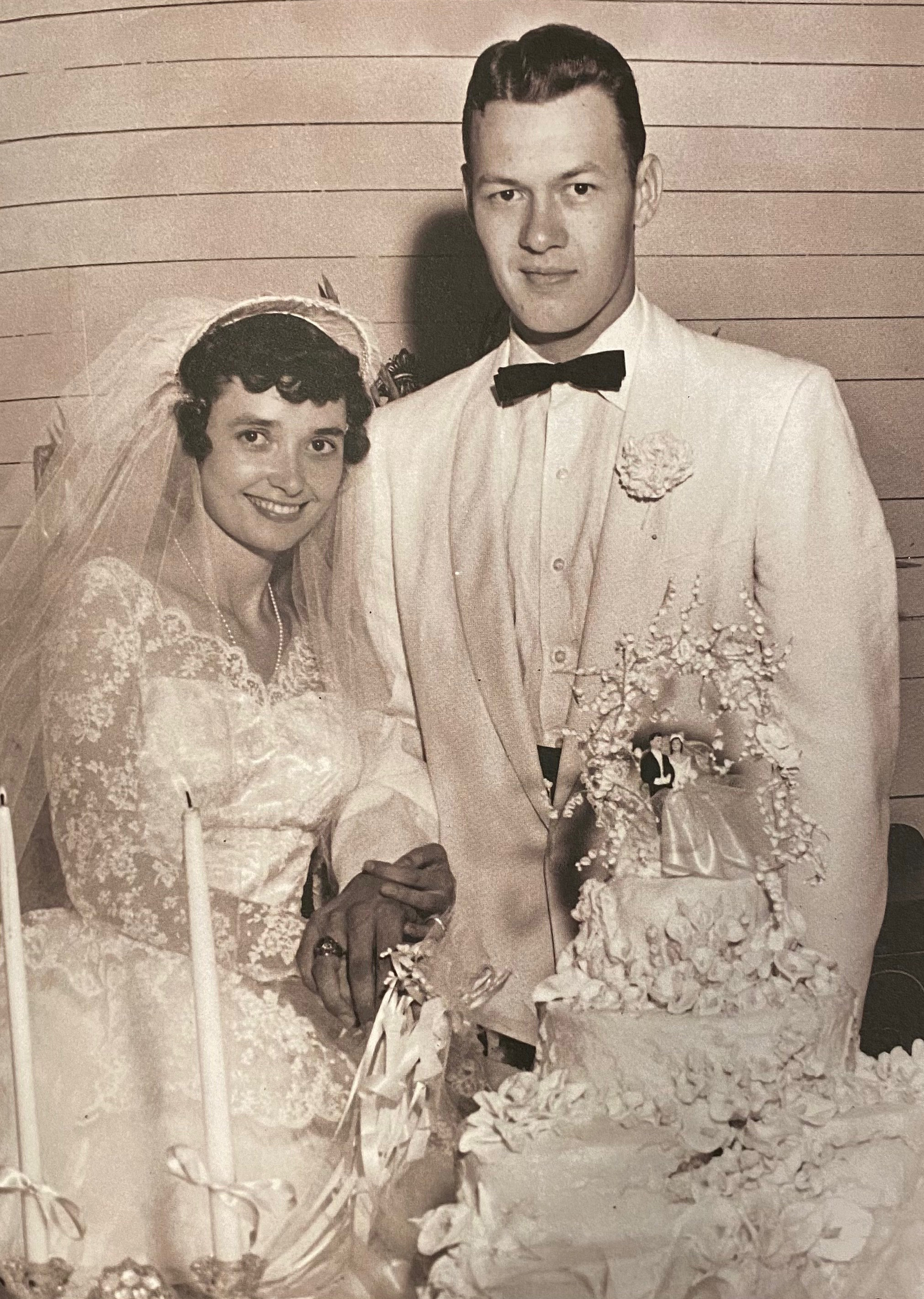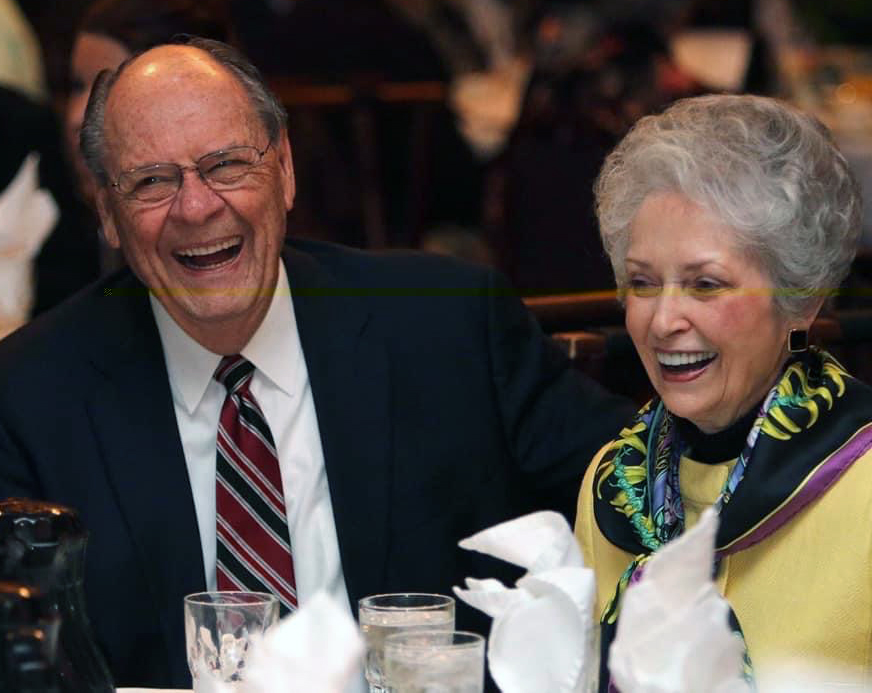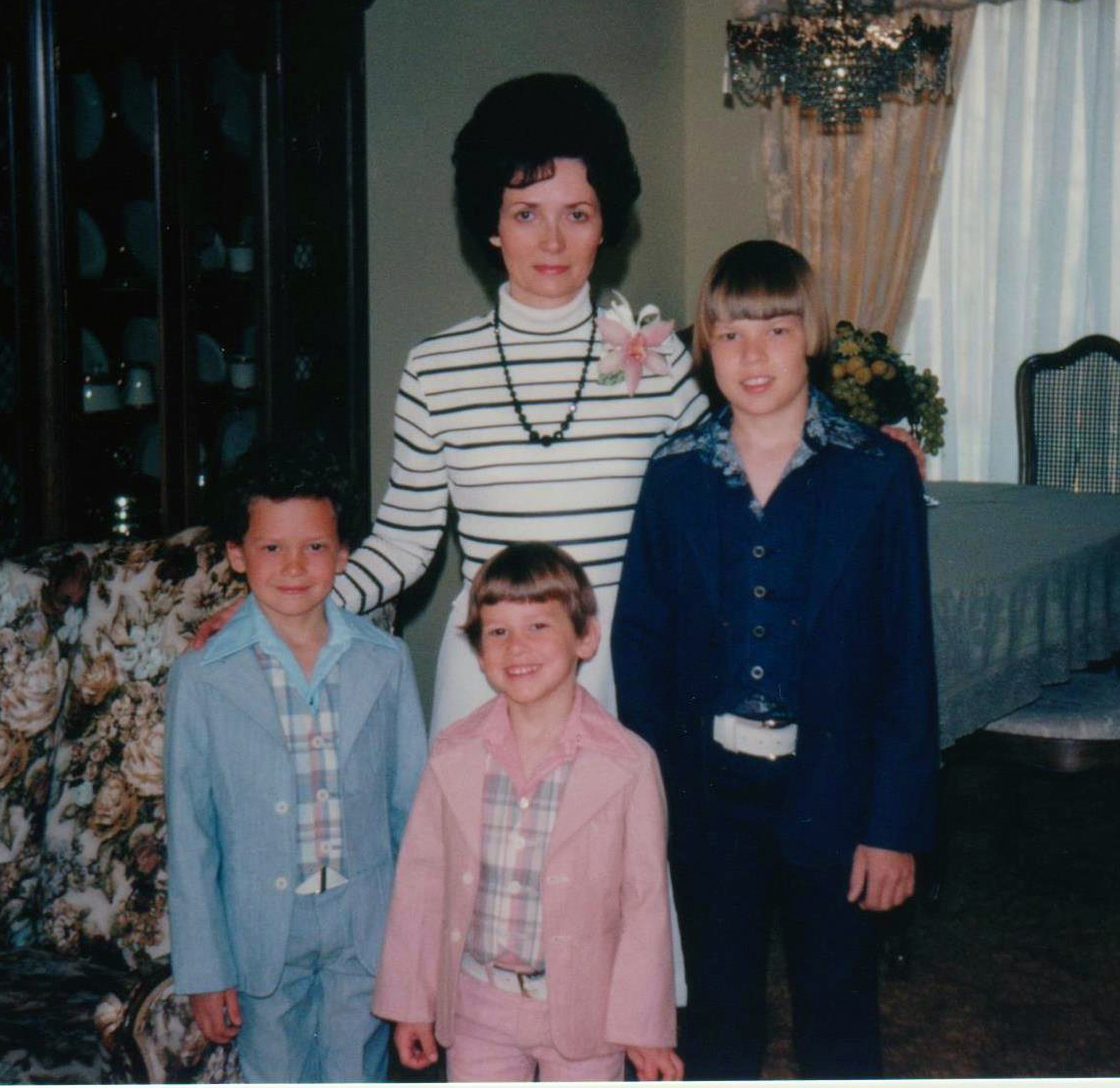The name Spence is intricately associated with Evangel University — but outside the campus, that is mostly because Robert Spence was the school’s president for 40 years.
Within the Evangel community, however, the president’s wife, Anne, was an equally familiar and beloved presence — a tireless supporter of students and staff as well as a booster for the university and helpmate for her husband.
At a memorial service two days after her March 3rd death at age 86, Anne also was remembered by her three surviving children — sons Jon, David and Stephen — as a loving mother, creative homemaker, inspirational role model and adventurous spirit.
But, they said through chuckles and smiles, often you had to be patient.
“Mom wasn’t driven by the clock,” said David, recalling that when he was growing up, “there were many Sunday mornings when we were sitting in the car in the garage — Dad in the driver’s seat, Jon and Steve and me in the back — waiting on Mom. When she finally got in the car, Dad drove with one hand on the wheel while holding her nail polish bottle in the other. And she’d throw her previous purse to me along with the new bag so I could change over the contents.”
Stephen said Anne ran on “Spence Time,” a trait he’s inherited. “To some people, Spence Time is kind-of frowned upon,” he admitted, “because if something is important, (people think) you should not just be on time, you’d be there early. And I understand this.
“But what if Spence Time means you’ve done everything you can do to make that moment as special as it could be. And since the clock doesn’t matter, every moment spent together is intentional. Spence Time means that the meeting, the dinner, the telephone conversation is over whenever it’s over. Because that moment in time is the most important moment.

“That was Mom,” said Stephen, who is a church pastor in Wisconsin. “That’s Spence Time. It was genuinely her. And it’s really super-cool.”
David, who is an executive with Wells Fargo in North Carolina, explained that “because of the way that Mom managed the clock, it afforded her the ability to take additional time with people. She never met a stranger, ever.”
Son Jon, who is a vice president and the chief academic officer at Evangel, noted that “if you were one of those individuals she spoke to, whatever your burden was, she took it, she owned it, she prayed over it. People knew that she cared deeply about the details of their lives.”
Deborah Larsen Higginbottom was one of those people. She came from a modest background in Chicago to enroll as a freshman at Evangel in 1978. “I was just taken with how beautiful and how kind Anne was,” she says. “We talked a lot, and she took to me.
“One year, I couldn’t afford to come back to school, but Anne kept in touch with me. The following year I was able to come back, and all through the rest of college we were very close. After I graduated, she still kept in touch.”
The relationship deepened as Higginbottom took a job as a recruiter for Evangel for five years. “Anne always told me I was like a daughter to her,” she says.
There was a poignancy to that statement. Because in the early years of their marriage — Anne and Robert wed in 1956 — the couple had a daughter, Jennifer, who died shortly after birth, and a firstborn son, Tommy, who succumbed to a congenital heart condition at age 5.

Jon, next in line, was just old enough to have some recollection of the tragic losses and the traumatic effect they had on Anne. “Losing a child is the worst pain,” he said. “I watched my mother as she navigated that, and it gave her the ability to help others.”
Carol Taylor succeeded Robert Spence as Evangel’s president for the next half-dozen years following his retirement in 2014. She says the loss of her eldest son and only daughter “shaped Anne into this very compassionate, caring person. It was real, all the way down to the bone.
“Anne was very mindful of those around her, especially those that others did not pay attention to. She noticed those individuals, and focused her attention on them.”
Paul Logsdon, who was chief public relations spokesman for Evangel from 1988 to 2020, says Anne was “very approachable. The students loved her. She was very supportive — she and Dr. Spence attended athletic events and theater productions. She was always the encourager, the cheerleader.
“Nurturing is a good word for what she did,” Logsdon suggests. “And, especially later in life, she was the ‘praying grandmother’ that everyone cherishes.’”
Anne was a grandmother nine times over in her own family. And she lavished Spence Time on them.
“The kitchen, meals, time around the dinner table — all those things were drivers for Mom,” said David. “It actually was a love language for her to show her appreciation for family and friends with the meals she cooked. The meals brought us together.”
Stephen offered similar memories: “The kitchen was the place where we all gathered, and Mom was the master of the kitchen.

“We always had breakfast together, and we always had dinner together. Breakfast wasn’t cold cereal – it was hot oatmeal or Cream of Wheat, it was grits and eggs, blueberry muffins and bran muffins.
“Mom liked to experiment,” Stephen continued. “She’d put ground lemon peel in the blueberry muffins but she wouldn’t tell us. She would lie in wait — and then she’d ask, ‘Do you taste anything different?’”
Supper menus included pepper steak, roast beef with mushroom gravy and white rice, fried pork chops, curry chicken, fried canned salmon, and macaroni and cheese. An unusual family favorite was called Pear Salad. Stephen said it consisted of canned halved pears with a dollop of mayonnaise in the middle and shredded cheddar cheese on top.
A white Buick Electra station wagon with a maroon interior carried the family on vacation road trips. However, they steered clear of fast food restaurants — except for Wendy’s. “Wendy’s hamburgers had lettuce, tomato and mayonnaise — and mayonnaise was super important in the Spence household,” Stephen said with a laugh, adding: “Real mayonnaise. None of that Miracle Whip salad dressing…”
Anne treated Evangel faculty and staff to annual dinner parties in the family home, preparing much of the meals herself. However, what is most remembered is the kindness and encouragement that Anne dished out year-round.
Shirley Shedd, who taught journalism at Evangel from 1981 to 2006 and now is the university’s volunteer archivist, remembers Anne as “one of the most cheerful and buoyant people I’ve ever known. She was so friendly and so outgoing, especially to students. She was an amazing, amazing woman.”
Anne also was enthusiastic and strategic with projects to enhance Evangel facilities. For many years she led the Evangel women’s auxiliary organization, and the group was successful in raising funds for several acquisitions and activities — especially a grand Schantz pipe organ for the new campus chapel that opened in 1982.

The auxiliary initially purchased a piano to be installed in the chapel. But as the building took shape, Shedd says, “Anne and others felt it would be nice to have a pipe organ in there rather than just a piano – in part because we had a wonderful pipe organ professor, June Kean, on the faculty.”
Preliminary investigation revealed that new pipe organs carried weighty price tags, so the auxiliary members decided to get a secondhand organ instead. “But Anne called me late one night,” recounts Shedd, “and she said, ‘Shirley, I don’t think the Lord wants us to have a used organ in that new chapel. We need a new one in there.’”
Shedd says Anne revved up the auxiliary’s fundraising campaign. “We had a recording made of organ music played by June Kean, and we sold those records all across the country to raise money.”.
The effort was successful in coming up with the required $150,000. “And one thing I’m especially proud of is that we had the organ paid for ’way before the chapel was paid for,” Shedd notes. “It showed what determined women can do.”
Another light-hearted memory of Anne involved her distinctive hairstyle.
“The higher the hair, the closer to the Lord,” son David said with a laugh, quickly emphasizing: “It looked nice — I loved her hair. But it required to be fixed every week.

“If Mom was traveling with Dad, their travel schedule had to orbit around her hair appointments. And if the trip was longer than a week and they wouldn’t be back for a regular hair appointment here, Dad needed to find a recommendation for someone to fix it along the way. Or drive faster.”
Shedd says that Anne “was always immaculately dressed.” Carol Taylor says that in describing Anne, words that come to her mind include “elegant” and “radiant.”
But the words most often mentioned in relation to Anne are “kind” and “caring.”
Taylor was especially touched by Anne’s concern over Taylor’s mother who was diagnosed with dementia. The Spences took Taylor and her mother out to dinner about once a month, and Taylor says the thoughtful outings were a special treat as her mom’s condition worsened.
Taylor’s mother died in 2017. At about that same time, Anne began to show troubling signs of mental decline herself.
“Shortly after my mom passed, Anne was beginning to struggle a bit. She and President Spence took me to the country club one evening, and after dinner, while he went to get the car and bring it around to the front door, Anne held onto my arm as we waited. She was aware that she was beginning to lose some capacity, and she asked me, ‘Did your mother forget words? Did you notice during dinner that I couldn’t get some words out…?’
“I told her not to worry, that she would never be alone. And she wasn’t.”

David described the years that followed: “When we lost Dad, it was sudden and unexpected,” referring to Robert Spence’s death in 2020 after suffering a stroke at age 84. “We lost him in three days. But we were saying goodbye to Mom for the past seven years.”
Deborah Higginbottom continued to stay in close touch with Anne after returning to Chicago, marrying and becoming a mom.
“Anne specialized in caring for and showing kindness to people,” says Higginbottom. “Helping someone find a home, connecting them to the right people, sending a letter or card, or cooking and delivering a meal. She was always present and in the moment.
“She never missed my birthday, both with a card and a phone call. She even sent birthday cards to each of my four children until they became adults. And I know we weren’t the only ones — she was thoughtful like that with many, many people.”
Higginbottom was able to do a special favor for the Spences a few years ago – although she insists that she was the one who really reaped the benefit.
President Spence was to be honored at the Assemblies’ annual General Council meeting, held that year in southern California. Higginbottom knew that Anne fervently wanted to accompany her husband to attend the award ceremony. However, Anne’s deteriorating condition made commercial travel impractical.
“God has blessed my husband and me,” Higginbottom says, “and we were able to offer Anne and President Spence and their family transportation to and from California in a private plane. The family was so grateful and appreciative. They gave me a beautiful necklace engraved with the words ‘Forever Grateful.’
“But it was a true gift from God to me, with four hours there and four hours back of precious time sitting across from Anne, talking, laughing and sharing, the two of us enjoying every minute.
“Anne has left a profound impact on my life just by her example,” Higginbottom says. “I am the one who is forever grateful.”
Stephen shared the last example that he witnessed of his mother’s instinctive and inclusive nature.
It happened shortly before she died, by which time the disease had robbed her of cognition and her ability to verbally communicate had dissipated to almost zero.
“The clearest words I heard from her were ‘I love you,’” said Anne’s youngest son, “even though by then she didn’t even really know who I was…”


